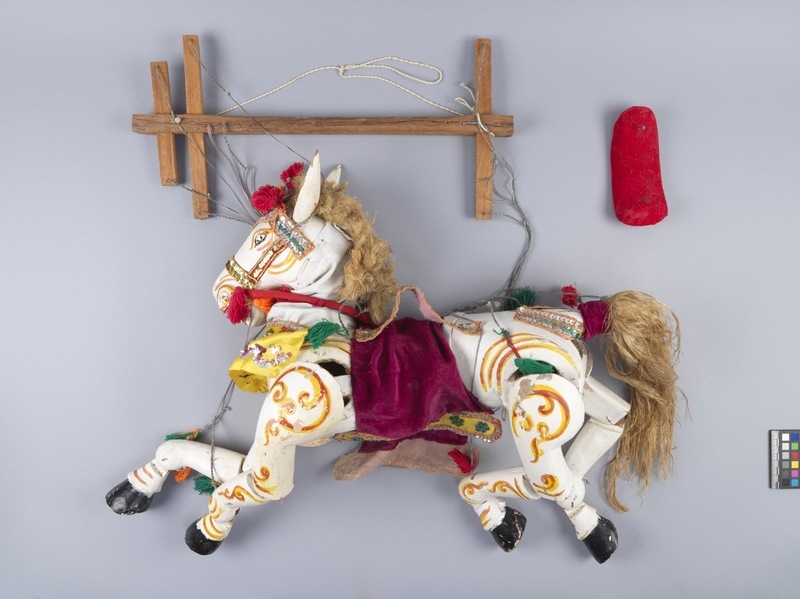String Puppet Item Number: 3307/1 a-b from the MOA: University of British Columbia


Description
String puppet or marionette myin (white horse) character consisting of a horse (part a) and saddle (part b). The horse is composed of many wooden parts, which are attached at the joints by string or nails. The mane and tail are made of plant fibre. The bridle and saddle are made of woven and velour fabrics, decorated with sequins, beads, tassels and embroidery. The horse is white with black hooves and is decorated with orange and yellow patterns. The horse is attached by many grey strings to a wooden control bar composed of a single long piece of wood with three cross-bars. The saddle (part b) is covered with red velvet, and has two long nails to attach to the horse.
History Of Use
Yoke thé, the string puppet or marionette theatre of Myanmar (Burma), originated in 1780, during the reign of King Singu Min, under the guidance of U Thaw, his minister for the performing arts. Plays begin with the creation of the world and the second part consists of episodes of the Jataka Tales (a Buddhist text) or from local folklore. Richly embellished, attired and stringed, there are 28 stock characters, consisting of human characters, supernatural beings, familiar animals, and fantastic creatures. These may include the White Horse (myin), the green-faced Jungle Ogre (Taw Belu), the City Ogre (Nan Belu), the mythological bird (Garuda), the monkey, the snake (Naga), the magician Zawgyi, a page boy, the King, Prince, and the Princess (from Shadows, Strings & Other Things, 2019). The White Horse (myin) and the green-faced Jungle Ogre (Taw Belu) appear at the beginning of the play to perform the energetic Creation of the World. The White Horse, this object, descends, prancing and rearing its agile body, alone on the stage, conjuring a spiritual force and dancing the world into being. In contrast, Jungle Ogre (Taw Belu)(see 3307/2) battles the City Ogre (Nan Belu) in a highly choreographed and menacing display of evil and aggression. They show their fangs and fight hand-to-hand with their golden daggers. The victor is always City Ogre (Nan Belu).
Narrative
This puppet was part of a puppet show seen by the donor when she was in Yangon in 1995. After the show she asked the puppeteers if they knew of a place where she might be able to purchase puppets like theirs, and they decided to sell her the ones from their performance.
Item History
What
Where
- Holding Institution
- MOA: University of British Columbia
- Made in
- “Myanmar: Rangoon” ?
When
- Creation Date
- before 1995
- Collection Date
- during 1995
- Ownership Date
- before July 26, 2018
- Acquisition Date
- on July 26, 2018
Other
- Condition
- fair
- Accession Number
- 3307/0001 a-b